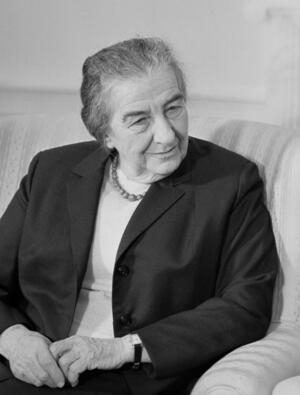Meninists, Meir and Madeleine L'Engle
Recently I have become aware of Meninist Twitter, an account with thousands of followers. An account whose purposes, as far as I can tell, are to argue that true gender equality means fighting for men's rights, to claim that women have an agenda that involves disadvantaging men, and, of course, to ridicule feminism (to give an idea, the Meninist Twitter's post of the day on April 2nd read, "Yesterday was the only day with jokes better than feminism."). Tweets from this account—many far too unsavory to repeat—have filled my Facebook and Tumblr feeds for several months, always providing me with ample reason to believe that I really do need feminism.
It may seem odd to compare Meninists to, of all people, Israel's fourth prime minister. But when I read this quote by Golda Meir, it’s the first thing that came to mind: “Women's Liberation is just a lot of foolishness. It's the men who are discriminated against. They can't bear children. And no one's likely to do anything about that.”
I rolled the idea around in my head for a while. What would I title the blog post? Golda Meir: Meninist seemed just a little bit too irreverent.
But more than that, I there is an inherent difference between Meir's and the Meninists' mockery of women's liberation. While I believe meninist men are afraid of seeing themselves as anything other than superior to women, Meir was a woman who could not, for the sake of her career, affiliate herself with femininity. I do not believe that Golda Meir, the original Iron Lady, would stand behind the statement, “God made man. But obviously sandwiches weren't going to make themselves. So God made woman.” (Meninist post of the day, March 30th) Rather, she would dismiss issues that did not further her campaign as someone who had already proved herself to be a capable female, focusing instead on issues of state. And, in zany Meir style, do so in the most tongue-in-cheek way possible.
Yet many a true thing is said in jest, and Meir's quote seems to speak to a misconception that is common among people who do not consider themselves feminists: the idea that somehow the existence of multiple genders means that one always has to come out on top, than any efforts at equality are simply are, in effect, a competition among genders.
Such people always remind me of a quote from one of my all-time favorite books, Madeleine L'Engle's A Wrinkle in Time. The (completely badass) protagonist, Meg, asserts that “Alike and Equal are not the same thing at all.”
Alike and equal are not the same thing at all.
L'Engle, I believe, intended this realization to be a statement against communism. In A Wrinkle In Time, the protagonists are faced with a dystopian society wherein all citizens are forced by an all-powerful dictator to behave exactly alike, as this is supposed to eliminate the conflict that arises from difference. They gather strength to resist the dictator when they realize that “alike and equal are not the same thing at all.” This is one of the quotes that has stuck with me throughout my childhood and youth as a simple yet profound statement about “equality”—a word that so many of us use, but which is hard to define in concrete terms. I also find encapsulated in this quote all of the reasons for which I am a feminist.
Alike and equal are not the same thing at all. Meaning that I can demand to be treated equally to a man, even though I am different than a man. My fight for equality does not mean that I want to be like a man. Being a feminist does not mean that I wish to exchange my estrogen for testosterone. It does not mean that I want to shed my own sex and gender and all of the ensuing implications in order to become privileged and powerful. It means that I want to be valued as a human being with thoughts, ideas, beliefs, strengths, and weaknesses, no matter how feminine I choose to be.
Meir was right of course: males and females have different biological traits. At this juncture in time, males cannot carry children. Similarly, I myself cannot grow a beard. However, this does not mean that a man can’t be seen as someone who is nurturing or vulnerable, or that a woman can not be seen as someone who is powerful and capable.
Alike and equal are not the same thing at all.
This piece was written as part of JWA’s Rising Voices Fellowship.







